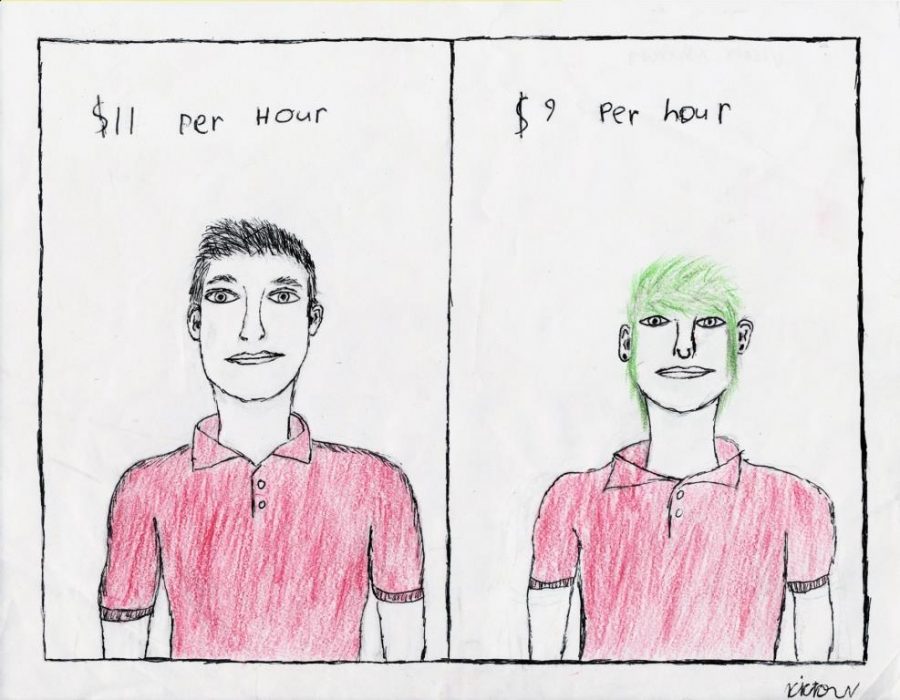Big gauges, low wages
Discrimination of body art, piercings and colored hair in the work place.
September 9, 2016
As many may know, I am currently a senior at HCP. Halfway through my junior year, I got a nose piercing. Nothing huge, right? That’s what I thought too, until I got a job at a local grocery store.
The first day at orientation, I decided to wear my hoop nose ring, which was probably not a good idea because the first thing the corporate manager told me was, “Don’t wear that again once you start working!”
At first when I started working, the manager was okay with me wearing only my nose stud, but he has recently departed from my workplace. Now the replacement manager enforces this rule more strictly. My front-end manager Roxxi Andra has always been able to wear her multiple nose rings as well as dying her hair multiple colors, but now, she has to cover it up.
After seeing this firsthand, I began to notice all of the other people with piercings, tattoos or colored hair and took into account the many other jobs that enforce similar policies.
For example, at HCP we welcomed AP Government teacher John Tipsword in August. He recently retired from the US Army and has tattoo sleeves on both arms. Each tattoo has its own story and meaning to him, and he has gotten many glances and comments.
“It’s followed by a sense of surprise or confusion when they realize I’m a teacher,” Tipsword said.
Head principal Dr. Mylo Miller said that the tattoos weren’t a factor in Tipsword’s hiring.
“Physical appearance doesn’t bother me, other things are more important. Just as long as they are not problematic. Professionalism is formed more by attitude and their set of values,” Miller said.
Before entering the military, Tipsword worked for his dad. During this time period, tattoos didn’t matter as much as they do now and before becoming a teacher he had some concern.
“I was concerned that my tattoos would prevent me from being hired, but I knew that none of my ink had any type of racist, gang affiliations, or inappropriate imagery at all,” Tipsword said.
Miller doesn’t have strict regulations when it comes to physical appearance, but what about other schools? HCP is a public school, but Casady School is a private, prestigious school located in Oklahoma City that has more stringent regulations and policies. Casady School head Nathan Sheldon gave information about the teacher and student appearance policies as well as his own input on the subject.
At Casady, these policies include acceptable pierced ears and nose studs, but other piercings are not accepted. Body art must remain covered at all times while in school dress and the faculty do not have this same policy but they are asked to not allow piercings or body art to be a distraction to others, which can be understandable considering the rigorous learning environment.
“I think that it should not affect the way others view a person. However, I also know that all too often we do judge people not by who they really are but by perceptions of what they might be based on how they look, talk, or dress. While I know none of these things should define us, it does have an effect on how some people view others in their profession,” Sheldon said.
Though appearance does have an impact on perspective, Sheldon listed the main notable things he finds important during the hiring process:
1. Can they, and do they, understand what it means to “always put the student at the center of the conversation?”
2. Do you know how to collaborate with other teachers and staff?
3. Do you believe in continual improvement of your craft and pedagogy?
4. Do you and can you develop a love for and really believe in the mission of our school?
If a person being hired refuses to cover their tattoos or piercings, they would not be hired. Because of this, they would be put at a disadvantage and wouldn’t be given the same opportunities one may have without body art.
This brings up another question revolving around this view of professionalism. What is considered professional? Is this the actual reason for these policies in workplaces? Jobs outside of school, such as at a bank or a credit union for example, have strict policies as well, such as not being able to show any type of tattoo, piercing or unnatural colored hair.
“You get used to it, and it’s not as bad as some may think. It’s for the company,” Weokie Credit Union employee Lindsay Wright said.
Professionalism plays a big factor in schools such as Casady and Credit Unions such as Weokie. However, at HCP, as well as where I work, they focus more towards culture and character. After hearing the multiple perspectives revolving around this topic, I realized that not all work places are reliant on company and employee image, but on personality and intention. I also noted that these rules aren’t to “punish” the employees or to make them look better, but to respect the customs and culture of customers and those around them.


